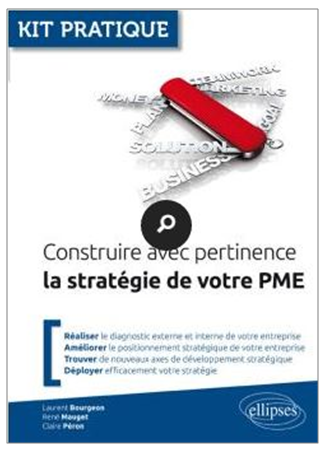Laurent Bourgeon, Academic Director of the Operational Management and International Operational Management programs at ESSEC Business School, and author of the book Construire avec pertinence la stratégie pour votre PME (Build an Effective Strategy for your SME, Ellipses, 2016), urges small-to-medium enterprises to develop a strategy and shares key insights into how to do it effectively.
Lift your head from the grindstone and don’t forget your swimsuit
Warren Buffet once said: ‘Only when the tide goes out do you discover who’s been swimming naked.’ In some ways, strategy is the swimsuit of the small-to-medium enterprise (SME). When everything is going well, we don’t worry about strategy and the swimsuit is left in the bottom of the drawer. It’s when things get tough – a takeover threat, the arrival of a new competitor on the scene, a change in the market – that we regret the absence of a long-term plan of action. The large multinational groups rarely find themselves without a swimsuit – very often it’s the owner-managers of SMEs who fail to take the time to develop a strategy.
Generally, directors and managers don’t devote enough time to thinking about strategy – research shows that 85% of management teams dedicate less than an hour a month to it. In the growth phase, directors of SMEs are often absorbed by daily operations – orders flow in, an important customer didn’t receive their order or another launches a call for bids. It is essential to remove your nose from the grindstone to study the big picture, make strategy a continuous process and dare to ask yourself questions that bear heavily on the future stakes and development of your company.
Be proactive
Business school students are used to working with case studies on the strategy of large groups that count thousands of employees and ten-figure operating profits. The mistake would be to think that only these large groups have to address the issue of examining strategy and obtain an overview of their activities and their future.
A strategic approach is not, contrary to popular belief, reserved for the big groups: those heading up SMEs must oblige themselves to take a step back and think about the future plans for the company. This means closely monitoring the changes in the market in which the SME is operating and being realistic about strengths and assets, but especially the weaknesses of these assets. Go fishing for data and let it speak to you. According to the results of your analyses, you would probably have to accept that your positioning no longer meets the realities of your industry and dare to change your offer or even, more fundamentally, your business model. All in all, it is crucial to always adopt a proactive rather than reactive posture.
Define… then deploy!
One in ten companies (this proportion varies somewhat according to different studies) effectively rolls out the strategy it defined. Strategic thinking within an SME is an excellent first step, but a classic mistake is to leave strategy at the bottom of the drawer and not apply it. A good strategy is also one that is given the means to be effectively deployed.
To satisfy the needs of effective roll out, Professor Laurent Bourgeon notably proposes using the Balanced Scorecard, or BSC, a well-known tool that is, however, used very little within French SMEs. This tool enables managers to ensure that their SME’s actions comply to the long-term objectives that were fixed by analyzing the company’s global performance using four major dimensions: financial, customer, internal processes and training.
Share, share – and share again
As an introduction to his strategy course, Prof. Bourgeon asks executive education participants the following question: who among you actually knows and understands the strategy of the company for which you work? On average, less than 10% of the audience raises their hand; and those that do often work for American, British or Canadian groups where large-scale annual or bi-annual assemblies are held to remind them of the corporate strategy. It is indeed rare to find a participant working in a French SME who raises their hand…except if the person in question is a manager, owner or creator of a company.
Share, share and share again the strategy with co-workers! Strategy is not a dark and obscure cloud reserved for top leaders and an inner circle of initiated individuals. In order for roll out to be effective, it is essential that all employees understand the strategy that was developed and feel committed to it. Strategy is neither limited to the large groups nor the top management of your SME: it is crucial to make it understood by your employees to roll it out effectively.
About the book:
At the origin of this book there are two conclusive observations. The first is that almost all the books and manuals on strategy use case studies and examples usually borrowed from large, multinational companies: Adidas, Bouygues, Danone, Google, L’Oreal, Microsoft, Renault, etc. and other groups of international scale make up most of the examples in strategy handbooks.
On the other hand, because SMEs in France represent two-thirds of all jobs today, half of value added and a third of investments, the participants in executive education that we have in the strategy course at ESSEC do not always identify with the case studies proposed, with a good two-thirds of them not working for large French groups in the CAC 40.
Students and participants often ask questions about how to adapt the tools and methods proposed within a course on strategy to real working life. Therefore, based on the feedback from students seeking to put into perspective the experience acquired during their internships and the issues raised by the executive education participants working in small organizations, through this book we wanted to propose a new outlook and new understanding of the tools, methods and concepts of strategic analysis – this time adapted to SMEs!










